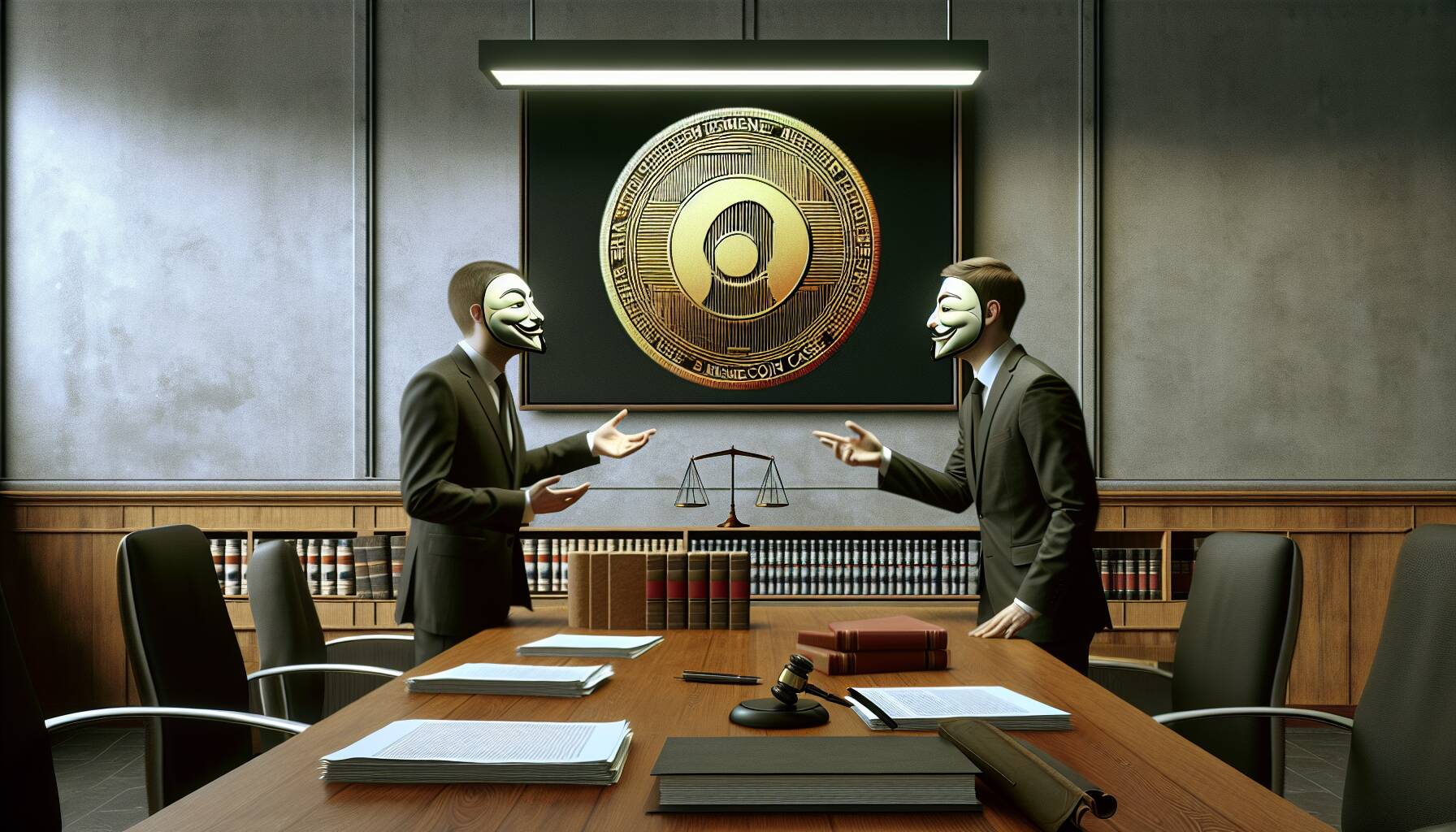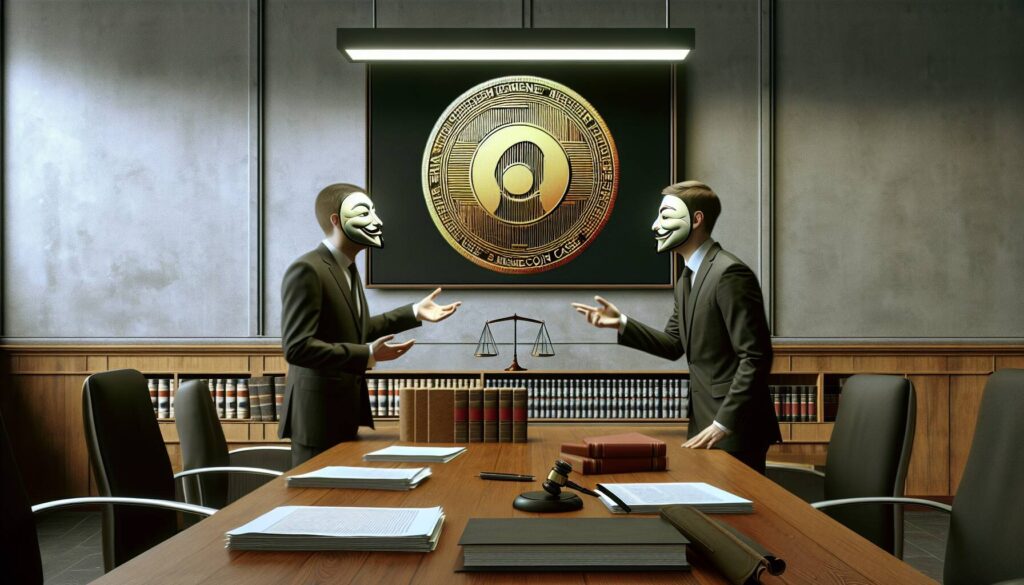The cryptocurrency field is once again entangled in controversy, as two law firms find themselves at the center of a storm involving a controversial memecoin named ‘DOGSHIT2′. This Solana-based cryptocurrency has reportedly surged by nearly 200%, as noted by data from CoinGecko, but it’s not the tokens’ dramatic price movement that’s making headlines—it’s the claim from the law firms that they are being impersonated by this memecoin.
Burwick Law, one of the firms involved, has issued a cease and desist letter to the creators of Pump.fun, the platform associated with the launch of DOGSHIT2. They argue that the token infringes on their intellectual property rights by falsely suggesting an affiliation that simply doesn’t exist. The firm insists, “Our firms have no affiliation, endorsement, or ownership interest in the Dogshit2 token or any related assets,” adding that they never launched any memecoins themselves.
“These efforts include the creation of memecoins that impersonate our plaintiffs. These acts represent the use of blockchain technologies as a tool for disrupting justice and due process,” Burwick Law stated.
The situation unfolds within the broader context of legal positions surrounding cryptocurrencies, particularly as they often hold the potential for misuse. In a previous case, Burwick Law played a key role in a lawsuit against the creators of the Hawk Tuah ($HAWK) token, accusing them of leveraging an individual’s internet fame to promote what they described as an unregistered security.
As the legal complexities of the cryptocurrency industry continue to evolve, this latest incident underscores the challenges that can arise when digital assets intersect with traditional legal frameworks. With rapid price shifts occurring in the crypto market alongside such allegations, it’s evident that the line between legitimate innovation and potential misconduct remains increasingly blurred.

Legal Controversy Over Memecoin Impersonation
The recent legal dispute involving two law firms and a memecoin called ‘DOGSHIT2’ raises important issues about intellectual property, online branding, and the impact of cryptocurrencies on legal proceedings. Here are the key points of the situation:
- Class Action Suit Initiation:
- Two law firms are proposing a class action suit against Pump.fun regarding the creation of a token called DOGSHIT2.
- The firms claim that they are victims of token impersonation, which may undermine their reputation.
- Token Controversy:
- DOGSHIT2, a memecoin based on Solana, has seen significant price spikes, complicating the narrative around its legitimacy.
- References to the token in legal documents suggest a connection to the law firms that the firms deny.
- Cease and Desist Demands:
- The law firms are demanding Pump.fun to cease the distribution and promotion of the DOGSHIT2 token.
- They assert that the creation of these memecoins is intended to interfere with ongoing litigation efforts.
- Intellectual Property Concerns:
- The firms argue that branding and likeness misuse could harm their clients and profession.
- This raises questions regarding the rights of firms to protect their intellectual property within the cryptocurrency domain.
- Impact on Justice and Due Process:
- The firms claim the use of blockchain technology in this manner disrupts justice and creates challenges in legal enforcement.
- They emphasize the need for regulation in the cryptocurrency space to prevent similar issues affecting the legal system.
“Our firms have no affiliation, endorsement, or ownership interest in the Dogshit2 token or any related assets,” stated Burwick Law.
This situation could impact the readers by highlighting the intersections between law and emerging technology, urging individuals to consider the ramifications of digital currencies and the legal protections available to brands and professionals. Understanding these issues might be particularly relevant for those engaging in the cryptocurrency market, legal professions, or holding investments in emerging assets.
Ill-Timed Memecoins Spark Legal Drama: A Closer Look
In a peculiar twist of legal and digital dynamics, two law firms have found themselves embroiled in a class action suit against Pump.fun, compounded by the emergence of a controversial Solana-based memecoin, ‘DOGSHIT2.’ This incident showcases the intersection of blockchain technology, intellectual property rights, and the ever-blurring lines of digital identity. But who stands to gain, and who might be adversely affected in this unfolding saga?
Competitive Advantages: The rapid rise of DOGSHIT2, reportedly surging almost 200% in value, highlights the volatility and allure of memecoins in the crypto market. Investors looking for high-risk, high-reward opportunities may see this token as an enticing option. Moreover, the controversy surrounding the lawsuit brings additional exposure, potentially boosting interest in DOGSHIT2 as a narrative-driven investment. For Pump.fun, the engagement catalyzed by the legal dispute could translate into heightened visibility and user interaction on their platform, appealing to the daring and tech-savvy audience that thrives on meme culture.
Disadvantages: On the flip side, the legal ramifications could deter potential investors or users wary of entanglements with firms facing litigation. The specter of legal challenges can cast a shadow on any token’s perceived legitimacy. Furthermore, if the court rules in favor of the firms, it could lead to penalties for Pump.fun or a crackdown on similar token launches, stifling innovation in a space that thrives on creative expression. The implications for memecoins could be far-reaching, possibly leading to increased regulation and scrutiny across the market.
The law firms involved may find themselves at a crossroads. While they may gain a platform to assert their intellectual property rights and champion a more regulated crypto environment, they could also drive away digital-native clients or investors who view such legal actions as a threat to the very ethos of the decentralized and unregulated innovation that defines the sector. Those closely following wannabe assets like DOGSHIT2 or future memecoins could either be energized by this scrappy legal battle or dissuaded by looming legal concerns regarding token launches.
Ultimately, the scenario is a fascinating case study of how traditional legal structures clash with the provocative world of digital finance, raising questions about the future of both memecoins and the legal entities struggling to keep pace with a rapidly evolving digital landscape.
















